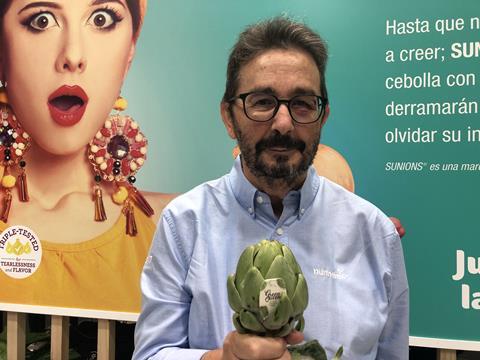New hybrid artichoke promises reduction in food waste and significantly higher yields than standard varieties

International fresh produce breeder BASF has launched its first hybrid artichoke variety, offering a longer post-harvest life and higher yield than standard varieties.
The Green Queen F1 artichoke will allow retailers to significantly reduce their in-store artichoke waste and improve shelf rotation, explained BASF’s country sales manager Francisco Solera at Fruit Attraction in Madrid. If stored correctly by consumers at home, the variety can be refrigerated for up to 15 days, he said.
The new release has a uniform shape; a full, tight heart; and a bright green colour. It does not brown easily, and its leaves are tender and flavoursome, BASF added.
As well as promising yields 30-40% higher than standard varieties, Green Queen has strong resistance to diseases such as the soil-borne pathogen Rhizoctonia solani.
It is being promoted under the ‘Amor a primera vista’ (Love at first sight) tagline.
Melon trials
At a press conference in Madrid, Solera also announced production growth in BASF’s new Galkia melon variety, which boasts a long post-harvest life of at least 12 days and has a ripeness indicator to ensure it can be harvested at exactly the right time.
The consumer brand is an umbrella comprising several genetically identical varieties serving different production windows. Commercial production of Galkia is already up and running in Spain and trials are taking place in Brazil and Senegal in a bid to achieve year-round supply.
In addition, production trials are taking place in Brazil and Central America for BASF’s Sunup melon which hit supermarket shelves in the summer of 2021.
The variety, which has high Brix and strong resistance to water stress, is similar to a cantaloupe melon but has a golden skin.
According to BASF, different varieties of Sunup can be grown in Senegal, Morocco, Spain, Brazil and Honduras, which should help to ensure year-round supply.



